Transfer News
April – June 2022
Cell4Chem: European research project on the production of green chemicals from residues using microbial communities
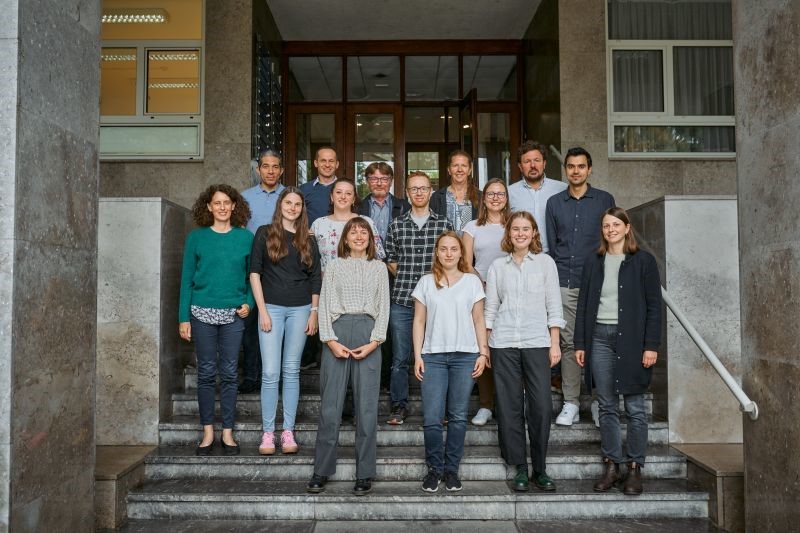 The Cell4Chem project is developing strategies and tools to unlock the full potential of microbial communities. Conversion processes are being researched that can be used to obtain high-quality chemicals (medium-chain carboxylates) from sustainable raw materials.
The Cell4Chem project is developing strategies and tools to unlock the full potential of microbial communities. Conversion processes are being researched that can be used to obtain high-quality chemicals (medium-chain carboxylates) from sustainable raw materials.
Medium-chain carboxylates (MCC) are speciality chemicals with a wide range of applications in various industries. However, they have so far been obtained from palm kernel oil or fossil raw materials. An anaerobic fermentation process is an environmentally friendly and value-adding alternative, with which MCCs can be produced from locally available organic residual and waste streams by complex bacterial mixed cultures. However, the applicability of the process is so far limited to a few substrates that are rich in ethanol or lactate.
Lignocellulosic residues as a resourceSubstrates containing lignocellulose are available in large quantities. The use of such substrates would greatly expand the possibilities for MCC production. However, due to their stable chemical structure, lignocellulosic substrates have so far been unsuitable as feedstock for MCC production.
The key: customised microbial communitiesTo enable the conversion of lignocellulose into MCC, Cell4Chem relies on microbial resource management as a means of targeted process control. Engineered microbial consortia combine MCC-producing bacteria with bacterial specialists that can effectively deal with the complex nature of lignocellulosic biomass.
International and interdisciplinary
The interdisciplinary research team, consisting of cooperation partners in Germany, France, Norway, Spain and Slovenia, pursues research approaches in synthetic biology, bioinformatics, systems biology and biotechnology. The project is coordinated by Dr. Heike Sträuber and worked on at the UFZ by members of the Microbiology Anaerobic Systems (MicAS) working group at the Department of Environmental Microbiology.
Cell4Chem's broad spectrum of methods is applied in a concerted manner to ensure optimal adaptation of microbial consortia in engineered ecosystems for anaerobic fermentation, to release the full potential of microbial communities and to pave the way for their use in biotechnological processes.
Since the start of the project in 2021, numerous presentations and posters have been contributed to various events, an international opinion survey among stakeholders and the general population has been conducted, a workshop on research data management has been held and much more. Currently, a short animated film is being produced to introduce the project to a wider audience.
For more information, visit www.ufz.de/cell4chem or follow Cell4Chem on LinkedIn or X (formerly twitter)!
June 2022
Arne Richter Award 2022 for multiple award-winning young scientist Dr. Jakob Zscheischler
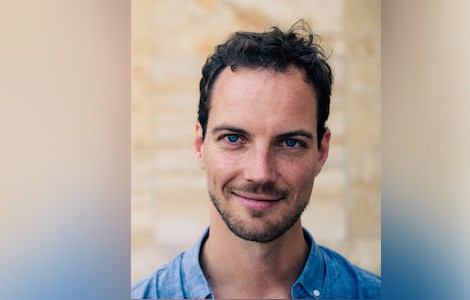 Dr. Jakob Zscheischler, head of the working group "Compound Weather and Climate Events" of the Computational Hydrosystems Department at UFZ received the Arne Richter Award in May 2022 during the annual meeting of the European Geosciences Union (EGU). The renowned prize for outstanding young scientists was awarded to him for fundamental work of international standing in which he defines and develops models for the identification and risk assessment of combined weather events in a changing climate.
Dr. Jakob Zscheischler, head of the working group "Compound Weather and Climate Events" of the Computational Hydrosystems Department at UFZ received the Arne Richter Award in May 2022 during the annual meeting of the European Geosciences Union (EGU). The renowned prize for outstanding young scientists was awarded to him for fundamental work of international standing in which he defines and develops models for the identification and risk assessment of combined weather events in a changing climate.
Jakob Zscheischler's multidisciplinary research spans the fields of climate science, natural hazards, hydrology and biogeochemistry. With more than 70 publications on compound weather events and on the prediction of heat waves, extreme precipitation, storms, droughts and their impacts, he has had a major impact on researchers, decision-makers and modellers of extreme events.
The Arne Richter Award recognises young scientists for outstanding scientific achievements in all areas of the geosciences.
Profile of Dr. Jakob Zscheischler
June 2022
RWInnoTec clears first hurdle for the IQ Innovation Award for Central Germany and the Saxon Start-up Award
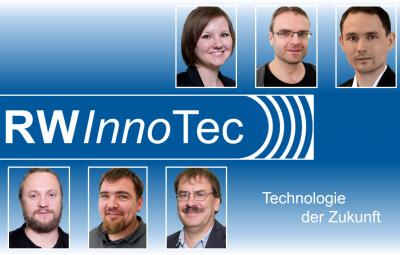 RWInnoTec GmbH has made it into the second selection round for the IQ Innovation Award Central Germany in the energy/environment/solar industry cluster with its innovation for environmentally friendly road rehabilitation using radio waves.
RWInnoTec GmbH has made it into the second selection round for the IQ Innovation Award Central Germany in the energy/environment/solar industry cluster with its innovation for environmentally friendly road rehabilitation using radio waves.
Out of 104 applicants, 28 teams will pitch in the next jury stage for first and second place for the IQ 2022 in their respective clusters and on 24 May 22 in an elevator pitch in front of a cross-sector jury for the overall victory.
The company is also in the running for the Saxon Start-up Award.
May 2022
Young scientist Dr. David Leuthold receives five awards
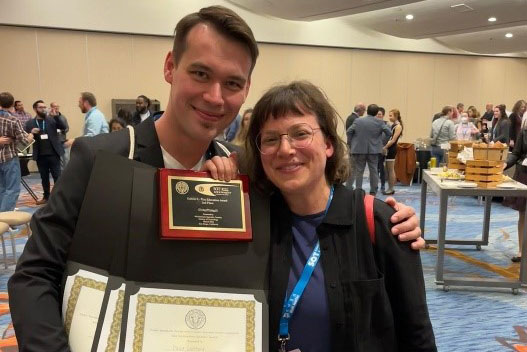 UFZ postdoc Dr. David Leuthold was an invited speaker at a symposium session entitled "New approach methods (NAMs) for functional developmental neurotoxicity (DNT)" at the annual meeting of the Society of Toxicology (SOT) in San Diego in spring 2022.
UFZ postdoc Dr. David Leuthold was an invited speaker at a symposium session entitled "New approach methods (NAMs) for functional developmental neurotoxicity (DNT)" at the annual meeting of the Society of Toxicology (SOT) in San Diego in spring 2022.
For his research on the development and application of a novel battery of automated behavioural tests to specifically detect chemical effects on learning and memory performance in zebrafish, he was given five research awards from different sections of the Society:
Postdoctoral Scholar Research Award - Molecular and Systems Biology Specialty Section - 1st place
for a research paper, in the context of a mentored postdoctoral position, and of great significance in the field of molecular and systems biology.
Toshio Narahashi Best Postdoctoral Poster Presentation Award - 2nd place
Gabriel L. Plaa Education Award - Mechanisms Specialty Section - 2nd Place
For postdoctoral researchers who conduct exceptional mechanistic research and contribute to the education of undergraduate and graduate students in toxicology.
Toshio Narahashi Best Postdoctoral Abstract Award - Neurotoxicology Specialty Section - 1st place
for research work impacting the field of neurotoxicology
Sheldon D. Murphy Postdoctoral Endowment Award - Mechanisms Specialty Section - 1st place
for an abstract of general scientific merit at the SOT Annual Meeting and relevance to mechanistic toxicology.
David Leuthold has been a postdoctoral researcher in the Molecular Toxicology group in the Department of Bioanalytical Ecotoxicology at UFZ since 2019. He is supported in his research work by his mentor Prof. Dr. Tamara Tal, Group Leader of Molecular Toxicology in the Department of Bioanalytical Ecotoxicology and Professor of Integrated Systems Toxicology at the Faculty of Medicine at the University of Leipzig.
Department of Bioanalytical Ecotoxicology
May 2022
New biomarkers pave the way for spin-off
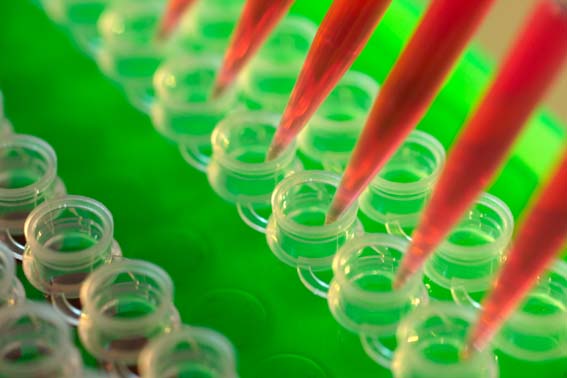 Within the BMBF-funded joint project "GlioPATH" (FKZ: 01ZX1402D) of the German Cancer Research Centre (DKFZ), Friedrich Schiller University Jena and the UFZ (Departments of Immunology and Ecological Chemistry), new biomarkers have been discovered for the detection and quantification of different types of cancer and for monitoring specific therapy approaches.
Within the BMBF-funded joint project "GlioPATH" (FKZ: 01ZX1402D) of the German Cancer Research Centre (DKFZ), Friedrich Schiller University Jena and the UFZ (Departments of Immunology and Ecological Chemistry), new biomarkers have been discovered for the detection and quantification of different types of cancer and for monitoring specific therapy approaches.
These transcriptional biomarkers allow to assess the activation of aryl hydrocarbon receptors (AHR), which plays an important role in many biological processes, e.g. cancer development, tumour invasion or chronic inflammatory and autoimmune diseases. In the process, the UFZ team researched the interactions of the AHR signalling pathways with the relevant metabolic pathways. This resulted in three joint inventions for which corresponding international industrial property rights were filed under the leadership of the DKFZ.
A team led by UFZ alumni Saskia Trump (formerly at Immunology Department) is now exploiting these intellectual property rights commercially and has founded cAHRmeleon Bioscience GmbH in the Heidelberg Technology Park. The spin-off develops biomarker and companion diagnostic services for precision medicine in cancer immunotherapy for the biopharmaceutical market.
Do you also have a spin-off idea? We would be happy to help you with it!
Contact Milina Alber (
milina.alber@ufz.de
).
May 2022
The UFZ presented solutions for agriculture and forestry at agra Leipzig
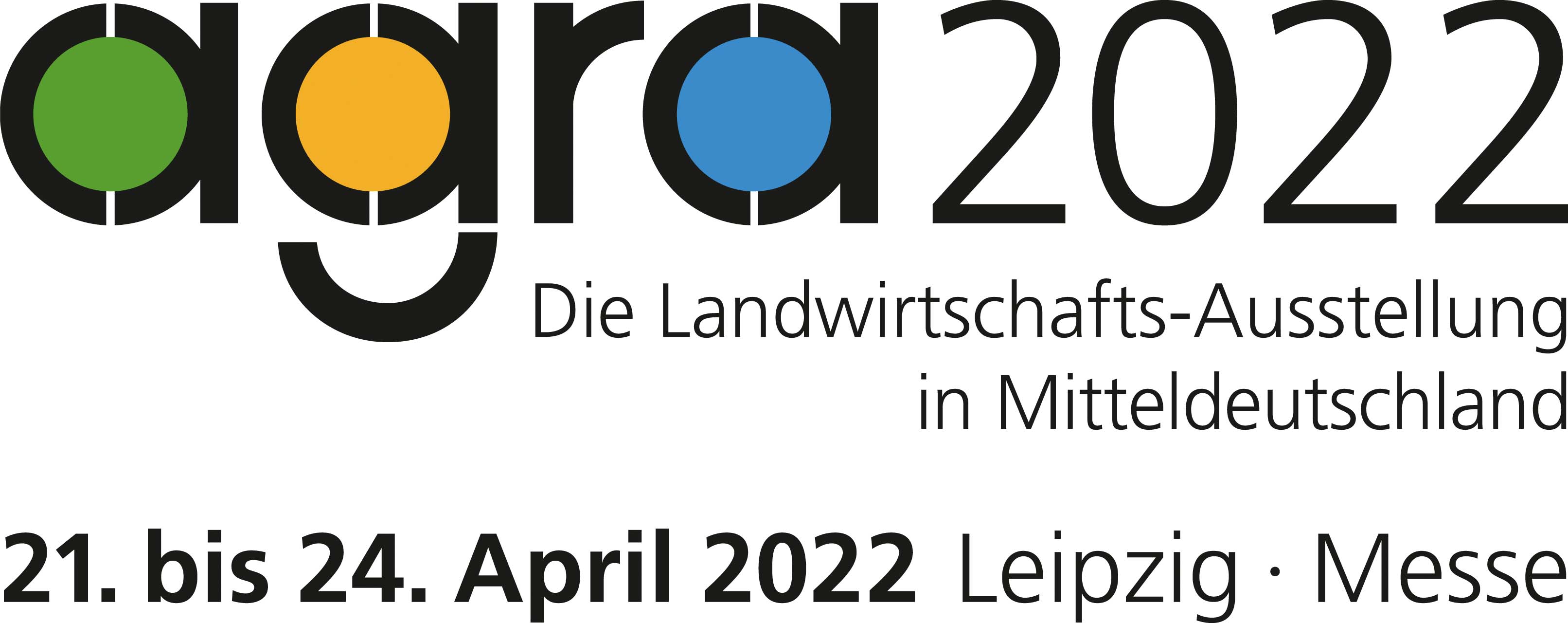 This spring, the agra fair took place again. The
agricultural exhibition in Central Germany enabled the agricultural and
forestry sector and its service providers to present their latest developments
and to exchange ideas.
This spring, the agra fair took place again. The
agricultural exhibition in Central Germany enabled the agricultural and
forestry sector and its service providers to present their latest developments
and to exchange ideas.
The organisers welcomed 1183 exhibitors and 50450 visitors in two halls and the large outdoor area at the Leipzig Trade Fair Centre. The main topics in 2022 were biodiversity in crop production, animal welfare and agra - forestry.
The UFZ was also there and welcomed visitors to its stand from a wide range of sectors such as agriculture and forestry, society and politics, including the Saxon State Minister for Regional Development, Thomas Schmidt. With the Drought Monitor and the Forest Condition Monitor, information services of the future were presented, as well as new product ideas for agriculture and tried-and-tested products, such as the Leipzig Foam Tester for minimising foam risks in biogas plants. The BMBF-funded BonaRes project provided information on sustainable use of the scarce resource soil.
The innovative plant tomography project received a lot of attention. This new method uses plenoptic cameras to determine plant physiological parameters without contact, thus enabling documentation of the current condition of above-ground plant parts. The in situ sensor technology is interesting for companies with field measurement technology as well as agriculture and forestry.
In addition to the specialist audience, interested members of the public were able to find out about the bee project "Leipzig hums and buzzes" and the UFZ Citizen Science projects FLOW-Monitoring (ecological monitoring of small watercourses and streams) or butterfly monitoring (recording of diurnal butterflies).
The UFZ participated in the supporting programme at the agra - Forstwelt forum with a presentation by Dr Daniel Doktor (Department Remote Sensing / RS) on the planned UFZ forest condition monitor.
All in all, UFZ researchers and the Knowledge and Technology Transfer Department were able to hold interesting discussions with the professional audience and gain insights for further research and transfer work as well as present UFZ projects.
Find more Information on the UFZ presentations:
UFZ-Dürremonitor (in German)
Waldzustandsmonitor (in German)
Pflanzentomographie (in German)
Leipziger Schaumtester (in German)
FLOW-Projekt (in German)
Tagfalter-Monitoring (in German)
Bienenprojekt (in German)
April 2022
Hydrogen: Key element of the energy transition
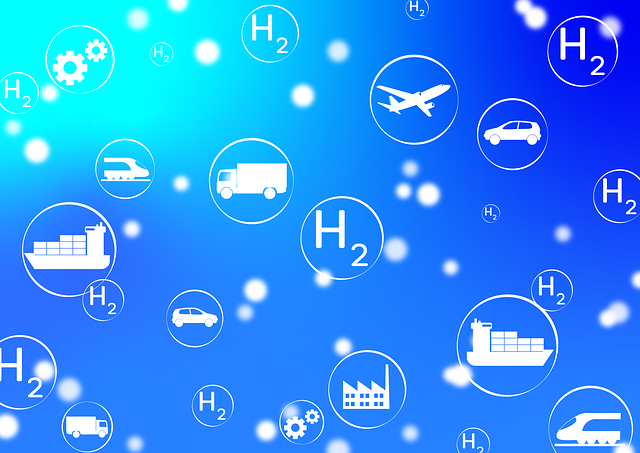 The UFZ Department of Solar Materials is successfully researching in this field and the inventors have succeeded in receiving a European Patent (EP3592836) for their "Process for the bioreactive extraction of produced oxygen from a reaction chamber, and use of phototrophic micro-organisms in the recovery of hydrogen".
The UFZ Department of Solar Materials is successfully researching in this field and the inventors have succeeded in receiving a European Patent (EP3592836) for their "Process for the bioreactive extraction of produced oxygen from a reaction chamber, and use of phototrophic micro-organisms in the recovery of hydrogen".
Patent applications for the process have also been filed in the USA and Canada.
It is a basic process for the production of hydrogen. By using whole-cell biocatalysis, higher yields will be possible in the long term and, in addition, the process avoids the formation of explosive oxyhydrogen gas by binding the oxygen produced directly in the cell. The UFZ has thus achieved another important success on its way to sustainable hydrogen production.
For more information, write to lydia.woiterski@ufz.de .
April 2022
